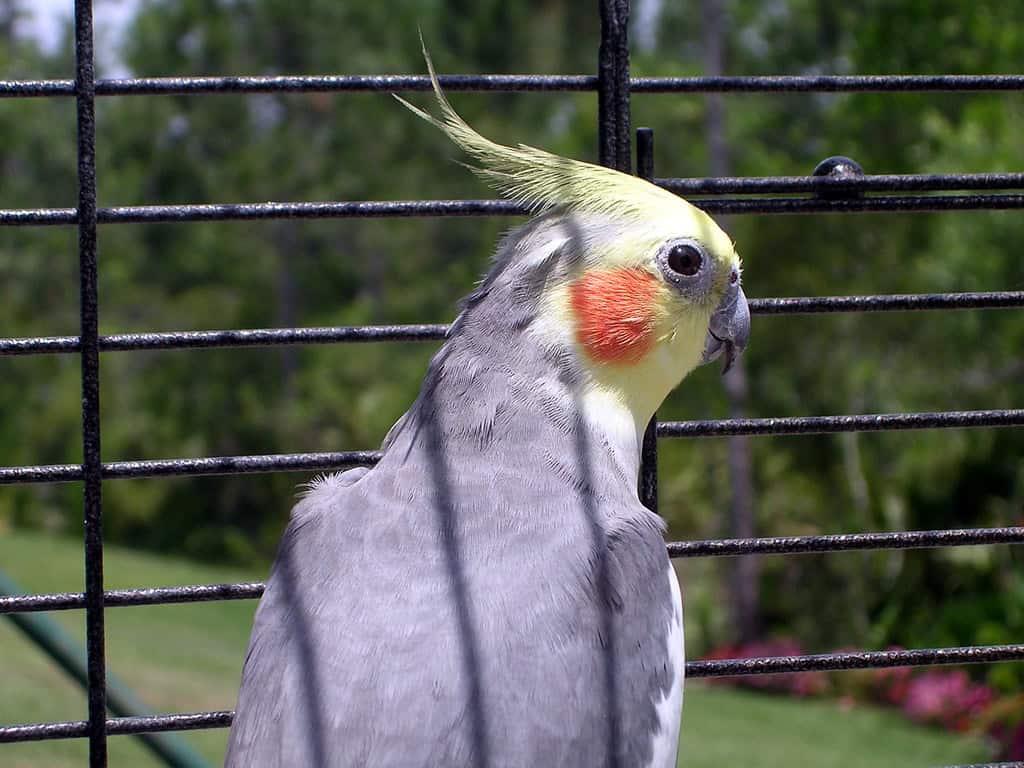Imagine coming home to find your cockatiel fluffed up and pacing anxiously in its cage. It’s a sight that can tug at any pet owner’s heartstrings. Stress in these vibrant birds isn’t just distressing; it can lead to serious health issues. Fortunately, learning how to prevent your cockatiel from becoming stressed is both simple and effective, ensuring your feathered friend stays happy and healthy.
Cockatiels, like any pet, thrive in environments where their physical and emotional needs are met. From the layout of their cage to the way you interact with them, every detail matters. In this guide, you’ll discover key strategies to create a serene sanctuary that keeps stress at bay and promotes a joyful, energetic bird. Whether you’re a new owner or looking to refine your care routine, these insights will transform your approach and strengthen your bond with your cockatiel.
Recognizing Signs of Stress in Cockatiels
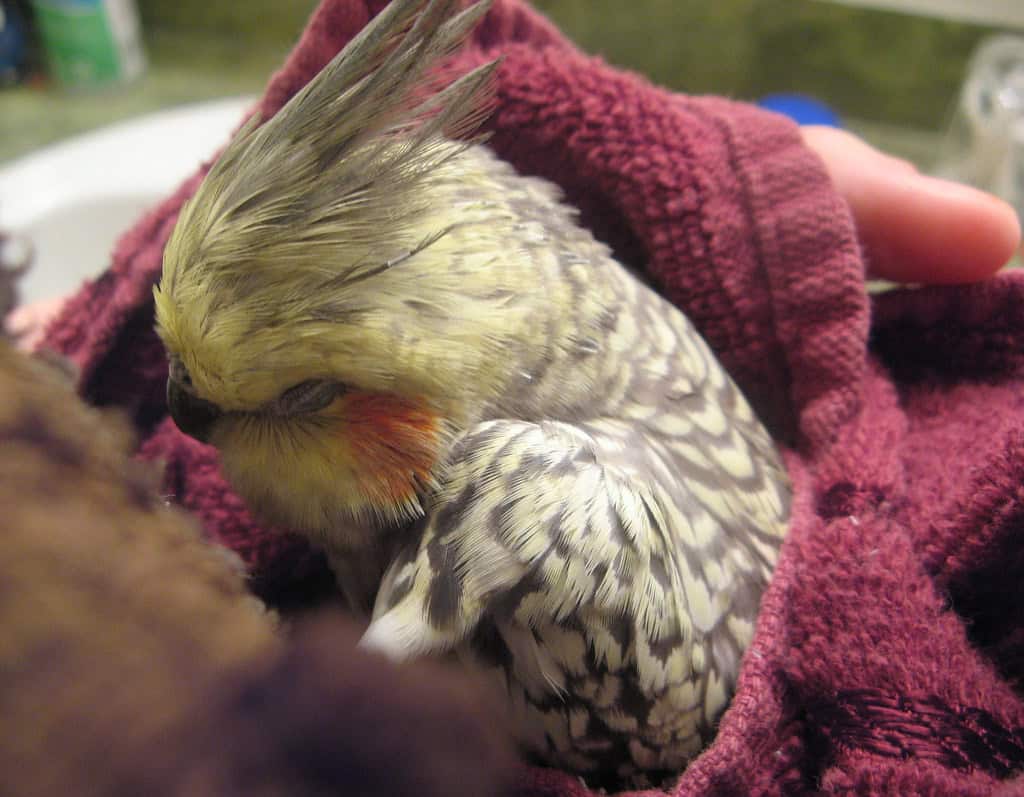
Identifying when your cockatiel is stressed involves observing changes in their behavior and physical condition. Recognizing these signs early helps in managing their environment to reduce stress effectively.
Common Behavioral Changes
You might notice several behavioral changes that indicate your cockatiel is stressed. One common sign is an increase in aggression; a normally docile bird may start to nip or bite. If your cockatiel suddenly screams more than usual or exhibits hyperactivity, these are potential red flags. Another clear indication is a change in their routine behaviors, such as reluctance to come out of their cage or a reduced interest in interaction with you or their toys. These shifts often signify discomfort or anxiety in your feathered friend.
Physical Symptoms to Watch For
Physical symptoms also provide clues about your cockatiel’s stress levels. Feather picking or plucking is a significant symptom that’s hard to ignore. This behavior often results from stress and can lead to bald patches on their body. Keep an eye out for stress bars—small lines across the shafts of their feathers—which develop when a bird is experiencing stress. Additionally, a decrease in appetite or changes in droppings (such as watery or discolored feces) can indicate health issues related to stress. Monitoring these physical symptoms enables you to react swiftly, possibly consulting a veterinarian if these signs persist.
Common Causes of Stress in Cockatiels
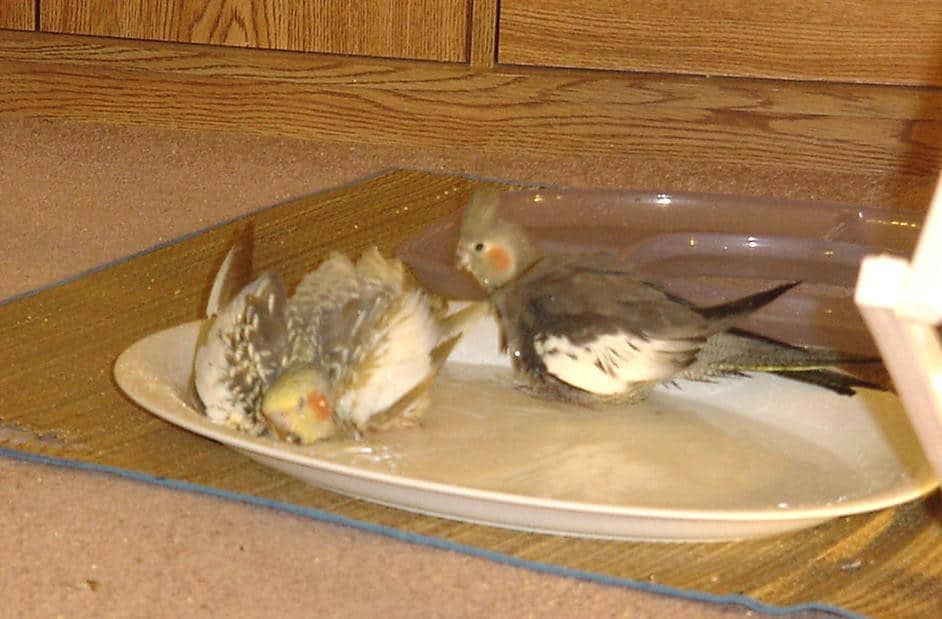
Understanding the common causes of stress in these pets is critical to ensuring your cockatiel’s health and happiness. Identifying stress triggers helps you take preventive measures swiftly.
Environmental Factors
Environmental changes are significant stressors for cockatiels. Sudden shifts in their surroundings can lead to anxiety and stress. Factors include a move to a new house or even alterations within your current home, such as rearranging furniture or loud noises. Irregular light cycles disrupt their natural rhythms, while poor air quality and extremes in temperature are also detrimental. Ensuring a consistent environment with proper lighting, minimal noise, and stable temperatures helps mitigate these stresses.
Social and Behavioral Triggers
Cockatiels are social birds and sensitive to changes in their social structure. The introduction of new pets, especially other birds or animals, can evoke stress. Lack of social interaction or insufficient mental stimulation also contributes to their anxiety. Inappropriate handling or changes in the daily interaction routines can unsetail your cockatiel. To maintain their mental health, provide regular, gentle interactions and introduce puzzle toys for mental stimulation, ensuring that social and behavioral needs are consistently met to keep stress at bay.
- Made in the USA specifically for Lovebirds, Quakers, Small Conures and Cockatiels.
- HEALTHY and DELICIOUS. Fresh, wholesome, natural bird food made with vegetables. Precisely formulated with the essential vitamins, minerals, and amino acids your bird needs every day for a balanced diet.
- ESSENTIAL NUTRITION. Fortified with essential vitamins, minerals, and amino acids. Feed daily to provide the foundation of your birds diet.
- FEED DAILY to provide your bird essential nutrition for a healthy and balanced diet.
- CONVERT YOUR BIRD TO A HEALTHIER DIET. Converting your bird to a food that includes pellets is worth the effort for his/her health and wellbeing. ZuPreem has been dedicated to producing innovative, high-quality products since 1967.
Preventative Measures to Reduce Stress
Creating a stress-free environment for your cockatiel involves understanding its needs for comfort and social interaction. Let’s explore how you can achieve this through specific measures.
Creating a Comfortable Environment
To create a comfortable environment, you’ll first focus on maintaining a consistent and predictable space. Ensure that the lighting mimics a natural light cycle, which helps regulate your bird’s biological rhythms. Excessive or harsh lighting can contribute to stress, so aim for gentle, natural light where possible. Keep the temperature in your cockatiel’s living area stable; sudden changes can lead to discomfort and stress.
Minimize noise levels in the room where you keep the cage. Loud sounds can be overwhelming for birds. Position the cage in a part of your house that is calm but still allows your feathered friend to observe daily activities without being in the path of constant household traffic. Incorporate environmental enrichment like perches, swings, and safe toys to keep your cockatiel engaged and entertained. Cleaning the cage regularly also prevents diseases, helping your bird to feel secure and healthy.
Ensuring a Healthy Diet
A healthy diet is a cornerstone of preventing stress in your cockatiel. Providing a balanced and varied diet not only supports your pet bird’s physical health but also contributes to its overall well-being, reducing the likelihood of becoming one of the many stressed birds. Make sure to offer a mix of seeds, pellets, fresh fruits, and vegetables to meet their nutritional needs. Avoid feeding your cockatiel unhealthy human foods, which can lead to nutritional deficiencies and stress-related health issues. Regularly check that their water supply is fresh and clean, as hydration is crucial for their health. By maintaining a healthy diet, you’re supporting your cockatiel’s vitality and resilience against stress.
Regular Social Interaction
Cockatiels are exceptionally social creatures that thrive on interaction. Allocate time for daily interaction with your cockatiel to prevent it from feeling isolated and stressed. Teach it simple tricks, talk to it frequently, and let it enjoy supervised out-of-cage time in a secure environment. These activities not only strengthen your bond but also provide essential mental stimulation.
If possible, introduce other birds for social interaction, ensuring they’re compatible to prevent aggression. Monitor these interactions closely at first to ensure they are positive experiences for all involved. Remember, the quality of social interaction is just as important as the quantity. Your consistent presence and engagement help keep your cockatiel feeling loved and mentally stimulated, which is crucial for its overall well-being.
Strategies for Stress Management
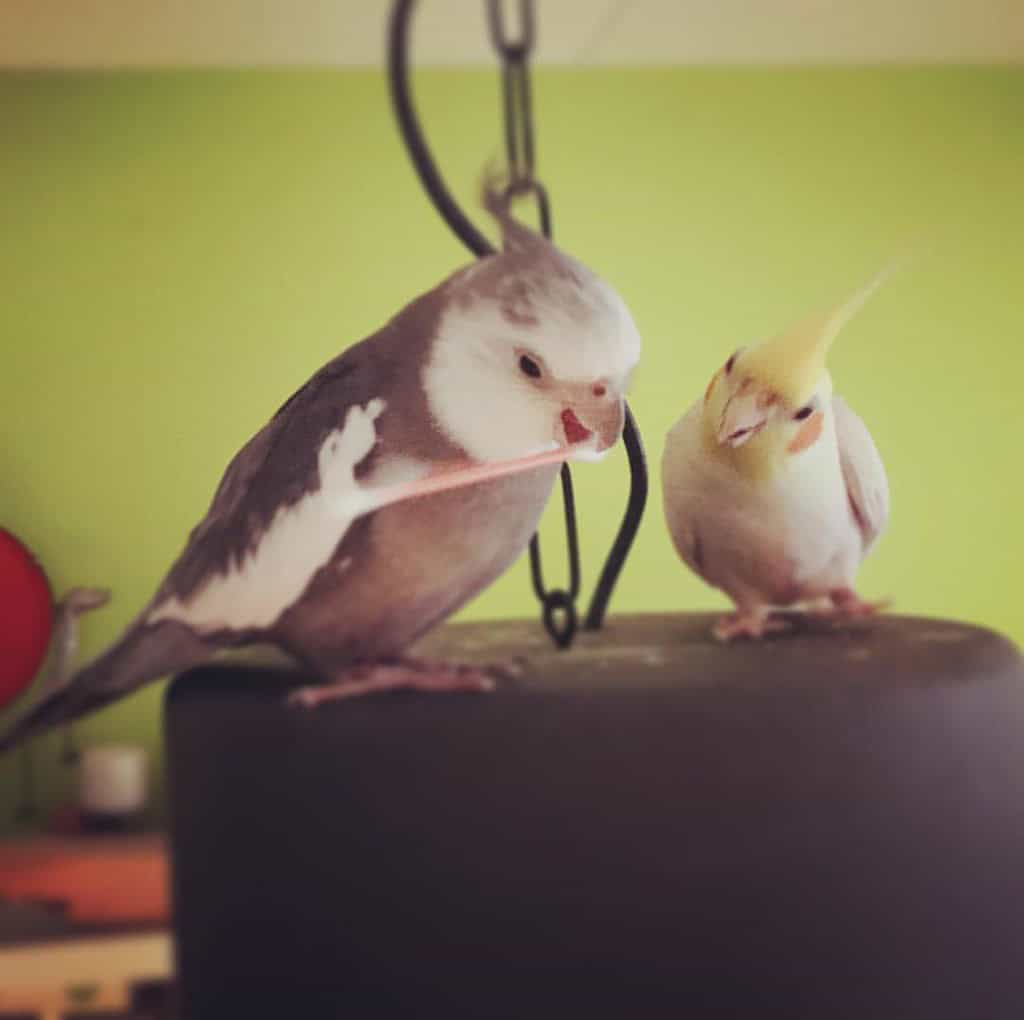
Managing stress effectively is paramount for cockatiels to ensure their wellbeing. The following sections provide insights on behavioral training techniques and the appropriate times to consult a veterinarian.
Behavioral Training Techniques
Training your cockatiel can be a potent stress reliever. Incorporating mental stimulation through training sessions helps ward off boredom and anxiety. Start by teaching simple commands like ‘step up’ or ‘come’, which not only strengthens your bond but also keeps your cockatiel engaged. Puzzle toys represent another excellent method of environmental enrichment, encouraging your feathered friend to think and explore, thereby reducing stress levels. Consistency in training sessions and positive reinforcement such as treats or gentle praise will make training a stress-free experience for your pet bird.
When to Consult a Veterinarian
Recognizing when stress in your cockatiel requires veterinary attention is crucial for maintaining their health. If you notice signs of stress such as feather plucking, decreased appetite, or stereotypical behaviors like head swinging or toe tapping, it’s time to consult a veterinarian. These symptoms could indicate underlying health issues that necessitate professional intervention. Additionally, if your bird’s stress seems linked to fear of unfamiliar animals or sudden environmental changes, professional advice can provide you with strategies tailored to your specific situation, ensuring that your cockatiel receives the best care possible.
Additional Tips for Bird Owners
Every bird owner should keep a detailed record of their pet’s health history. This information can be invaluable when consulting a veterinarian, helping to identify patterns or triggers related to your cockatiel’s stress. Regular check-ups are also essential to catch any potential health issues early, providing peace of mind that your bird is in optimal condition.
Advanced Techniques for Stress Reduction
While the fundamental strategies for preventing stress in cockatiels are essential, incorporating advanced techniques can take your efforts to the next level. These approaches involve understanding your cockatiel’s behavioral cues more deeply and using specialized methods to ensure their well-being.
1. Enrichment Through Environmental Design
Cockatiels are highly intelligent birds that thrive on mental and physical stimulation. To cater to their complex needs, consider designing an enriching environment that goes beyond basic toys and perches.
Creating a Varied Space: Install multiple types of perches at different heights and materials (e.g., natural wood, rope, and cement) to mimic a natural habitat. Adding climbing structures like ladders and swings will keep your cockatiel physically active and mentally engaged. Rotate toys regularly to prevent boredom, and introduce new items periodically to maintain interest.
Foraging Opportunities: Cockatiels in the wild spend a significant amount of time foraging for food. You can replicate this natural behavior by providing foraging toys that hide treats or pellets. These toys encourage your bird to use its beak and talons in a constructive manner, reducing stress and promoting mental stimulation.
2. Socialization and Interaction Strategies
Cockatiels are highly social and require regular interaction to stay happy. Beyond basic daily interactions, you can implement advanced socialization techniques to strengthen your bond and ensure your bird’s emotional well-being.
Positive Reinforcement Training: Use positive reinforcement techniques to encourage desired behaviors. Training sessions should be short and fun, using treats, praise, or playtime as rewards. Training can include commands, tricks, or even target training where your cockatiel learns to follow a stick or a target with its beak.
Scheduled Playtime: Establish a routine that includes scheduled out-of-cage playtime in a safe, bird-proofed area. During these sessions, allow your cockatiel to explore new spaces, interact with different objects, and experience varied sensory inputs. This practice helps reduce stress by providing physical exercise and mental stimulation.
Bird Socialization: If you’re considering introducing another cockatiel or different bird species, do so gradually and carefully. Monitor their interactions closely, ensuring that they are compatible and that neither bird shows signs of aggression. Proper introduction can lead to successful social bonds, reducing loneliness and enhancing your cockatiel’s social experience.
3. Understanding and Managing Seasonal Changes
Cockatiels are sensitive to seasonal changes, and their stress levels can vary throughout the year. Understanding these changes and adapting their care accordingly can prevent seasonal stress.
Seasonal Molt: Cockatiels undergo a molt, or feather replacement process, typically once or twice a year. During this period, they may appear more irritable or stressed due to the physical discomfort of feather loss and regrowth. Provide extra care during molting by offering a nutritious diet rich in vitamins and minerals to support feather health.
Temperature Sensitivity: Cockatiels are sensitive to temperature extremes. Ensure that their living space remains comfortable throughout seasonal changes. During summer, provide a cool, shaded area and ensure adequate ventilation. In winter, keep the area warm but avoid direct exposure to heaters or drafts that can cause temperature fluctuations.
4. Behavioral Enrichment Activities
In addition to physical toys and foraging opportunities, engage your cockatiel in behavioral enrichment activities that challenge their intelligence and provide mental stimulation.
Interactive Games: Create interactive games that encourage problem-solving. For example, hide their favorite treats inside puzzle toys or food dispensers that require manipulation to access. These games stimulate your cockatiel’s cognitive abilities and keep them occupied.
Training Challenges: Teach your cockatiel more advanced tricks or commands, gradually increasing the difficulty level. This can include tasks like retrieving objects, navigating obstacle courses, or responding to verbal cues. Challenging your bird mentally will help reduce stress and prevent boredom.
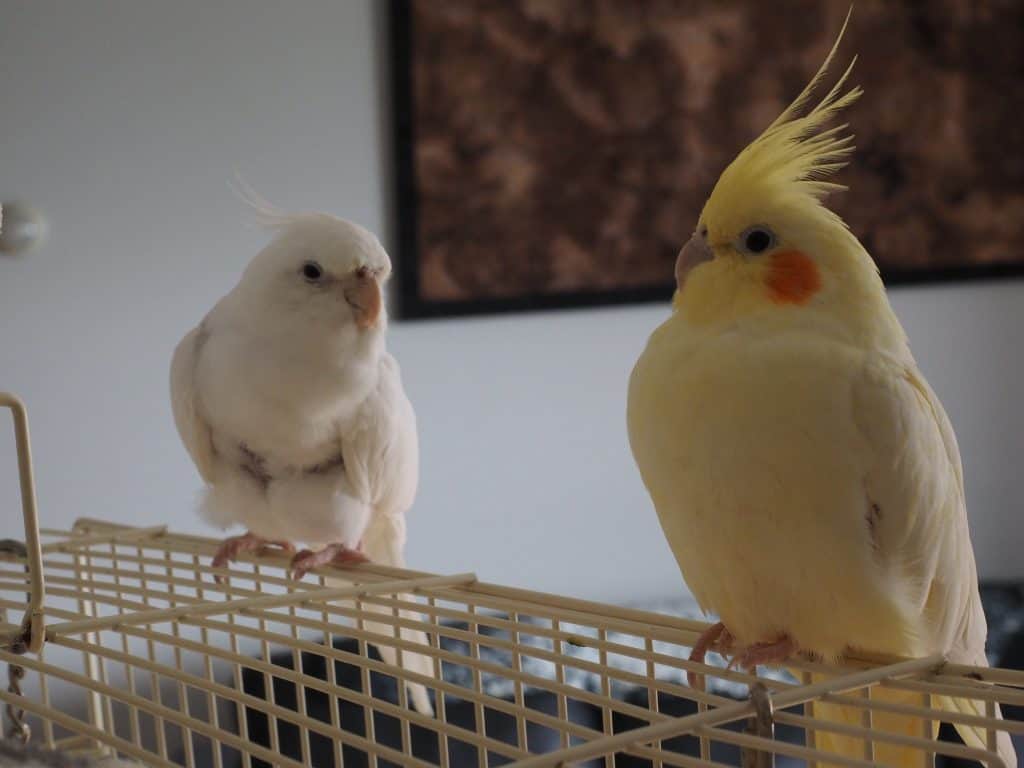
5. Regular Health Monitoring and Preventative Care
Routine health monitoring and preventative care play a crucial role in preventing stress and maintaining overall well-being.
Health Check-ups: Schedule regular check-ups with an avian veterinarian to monitor your cockatiel’s health. Regular health assessments can help catch any potential issues early, before they become major problems.
Behavioral Observations: Maintain a daily routine of observing your cockatiel’s behavior and physical condition. Keeping a journal of any changes or abnormalities can help you identify patterns or triggers related to stress.
Grooming and Hygiene: Regular grooming, including nail trimming and feather care, is essential for your cockatiel’s health. Ensure that their living space is clean and free of potential hazards that could contribute to stress or illness.
6. Adapting to Life Transitions
Life transitions, such as moving to a new home or the arrival of new family members, can be particularly stressful for cockatiels. Implement strategies to help your bird adapt smoothly to these changes.
Gradual Introductions: When introducing new elements into your cockatiel’s environment, do so gradually. For example, if you’re moving to a new home, acclimate your bird to the new space slowly by allowing them to explore one room at a time.
Consistency and Routine: Maintain consistency in your cockatiel’s routine as much as possible during transitions. Familiar routines help provide a sense of stability and security, reducing stress during periods of change.
Final Thoughts: How to Prevent Your Cockatiel From Becoming Stressed
Ensuring the well-being of your cockatiel requires a proactive approach to managing stress. By creating a stable and enriching environment, you can help prevent your pet bird from becoming one of the many stressed birds. Regular social interactions and engaging activities are essential for maintaining your pet bird’s happiness and health. If you notice any concerning behaviors, don’t hesitate to consult with a veterinarian. By understanding and mitigating stressors, you can foster a serene and fulfilling life for your feathered friend, strengthening your bond and promoting their overall well-being.
Other suggested articles:
Can Cockatiels Wear a Harness?
Can you catch Avian Flu from your Cockatiel?
- How Can Your Other Pets Be Harmful To Your Cockatiel
- How Cockatiels Show Affection
- How Do Children Make Cockatiels As Pets
- How Do Cockatiels See
- How Do Cockatiels Sleep
- How Do Fumes Affect Your Cockatiel
- How Do You Care For Your Cockatiel Everyday
- How Do You Choose A Cage For Your Cockatiel
- How Do You Medicate Cockatiels
- How Do You Provide Your Cockatiel With Water
- How Do You Select Your Cockatiel
- How Do You Tame A Cockatiel
- How Does A Cockatiel Got Her Name
- How Far Can A Cockatiel Fly
- How Far Can A Cockatiel See
- How Fast Can Cockatiels Fly
- How Good Is A Cockatiels Memory
- How Long Can A Cockatiel Go Without Food
- How Long Can Cockatiels Go Without Water
- How Long Do Cockatiels Actually Live For In Captivity
- How Long Do Cockatiels Live In Captivity
- How Long Does It Take For Clipped Wings To Grow Back
- How Long Does It Take For Cockatiel Tail Feathers To Grow Back
- How Long Should A Cockatiel Be Out Of Its Cage
- How Often Do Cockatiels Lay Eggs
- How Often Do Cockatiels Poop
- How Often Should A Cockatiel Go To The Vet
- How Should I Set Up My Cockatiels Cage
- How To Bathe Your Cockatiel
- How To Bird Proof A Room
- How To Bond Two Cockatiels
- How To Bond With A Scared Cockatiel
- How To Build Trust With A New Cockatiel
- How To Calm A Stressed Cockatiel
- How To Care For Your Cockatiels Health
- How To Care For Your Cockatiels Nails
- How To Catch A Cockatiel
- How To Clean Cockatiel Nose
- How To Clip A Cockatiels Nails
- How To Discipline A Cockatiel
- How To Find A Cockatiel That Flew Away
- How To Get A Cockatiel Back Into Its Cage
- How To Get A Cockatiel To Go On Your Hand
- How To Get A Cockatiel To Like You
- How To Get A Cockatiel To Sit On Your Finger
- How To Give Your Cockatiel Exercise
- How To Grow Millet For Cockatiels
- How To Hold A Cockatiel
- How To Introduce A New Cockatiel To Another
- How To Keep A Cockatiel Quiet
- How To Keep A Cockatiel Warm 10 Tips And Tricks
- How To Maintain A Clean Cockatiel Cage
- How To Make Your New Cockatiel Feel At Home
- How To Manage Multiple Cockatiels In One Household
- How To Monitor Your Cockatiels Health
- How To Prepare Your Cockatiel For Travel
- How To Prevent Your Cockatiel From Becoming Stressed
- How To Recognize And Treat Cockatiel Anxiety
- How To Take Care Of An Older Cockatiel
- How To Tame A Cockatiel That Bites
- How To Tame Your Cockatiel
- How To Teach A Cockatiel To Talk
- How To Tell If A Cockatiel Is In Pain
- How To Tell The Age Of A Cockatiel
- How To Toilet Train Your Cockatiel
- How To Train A Cockatiel To Fly To You 8 Steps
- How To Train A Cockatiel To Poop In One Place
- How To Train Naughty Cockatiels
- How To Transition Your Cockatiel To A New Cage
- How To Transport A Cockatiel To The Vet
- How To Trim A Cockatiels Beak
- How To Trim Your Cockatiels Wings
